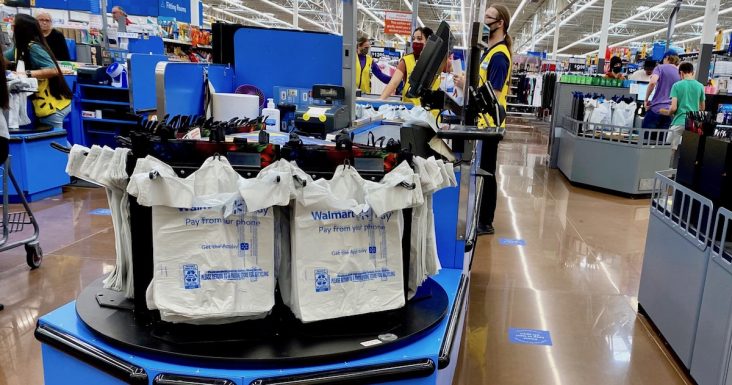Walmart tests replacements for plastic shopping bags
by November 7, 2021 9:59 am 189,214 views

Walmart is testing a new replacement for single-use plastic shopping bags. Working with Closed Loop Partners’ Consortium to reinvent the bag, Walmart is testing several concepts, including some that use mobile technology. CVS and Target are also part of the consortium.
Jane Ewing, senior vice president of sustainability at Walmart, said a store in Santa Clara, Calif., has tested a plan called Fill It Forward, a mobile app and RFID tag that connects to a reusable bag customers already own.
With each use, customers accumulate points, which convert to a dollar amount that goes back to a local organization. The Santa Clara test donated funds to the Second Harvest Food Bank of Silicon Valley. Walmart said Fill It Forward caused a 31% increase in adoption of reusable bags during its run.
Walmart Store No. 2280 in Mountain View, Calif., tested a mobile app-enabled idea called GOATOTE, which enables customers to use an app to “check out” reusable bags. The bags are free if returned to the store within 30 days. If they decide to keep their bag, customers will be charged $2.
The tests in California are in addition to ongoing tests on the East Coast. Ewing said its stores in Vermont are bagless and completely transitioned to reusable bags working with the state’s sustainability initiatives. She said there also is a bagless pilot in Maine. Ewing said customers in the states have told the retailer they were ready to make the change.
“By choosing to go bagless in Maine and Vermont, we’re learning a lot that we can share with other regions. And though these transitions come with a learning curve for customers and associates, they’ve also shown that Walmart customers have a deep desire to do the right thing for our planet, and our collective future,” Ewing said.
She said Walmart is aware that reinventing the retail bag won’t be easy or quick. Ewing said the retail giant is encouraged by the process made in these four test markets and innovative solutions that came out of the consortium’s work.
“Key learnings from these efforts will inform our future bagless efforts. We’ll keep working to do our part to serve the customer while moving toward a cleaner, more sustainable future,” Ewing said.
Walmart has not publicly disclosed how many bags it uses annually, but sustainability advocate As You Sow estimated in 2020 that Walmart distributes up to 20 billion single-use bags per year. Kroger said it distributes 6 billion bags annually and has also agreed to phase out single-use bags by 2025.
As You Sow also reports more than 470 U.S. municipalities in 28 states now ban or charge fees for single-use plastic carry out bags. California, Connecticut, Delaware, Hawaii, Maine, New York, Oregon, and Vermont and more than 50 countries have taken action to ban or restrict plastic bags. The environmental group said U.S. plastic bag recycling rates are estimated at less than 5%.
Walmart pledged in 2008 to reduce its global plastic shopping bag waste by an average of 33% per store by 2013. In it’s latest Environmental Sustainability Governance report in 2020 Walmart said plastic bags only account for an estimated 6% of the retailer’s plastic packaging footprint in the U.S.
Walmart said it encourages consumers to pack bags fully at check-out and it also has plastic bag collection bins in the entry ways of its stores. Walmart said it is making progress in the test markets with the Consortium, and in Canada the goal is to reduce single-use plastic bags by 50% from 2018 to 2025. There is no overall U.S. goal set.
Aldi, a grocery and consumable competitor to Walmart, does not provide shopping bags for its customers. The discounter said it does not provide bags as an effort to cuts costs and for the environment.
